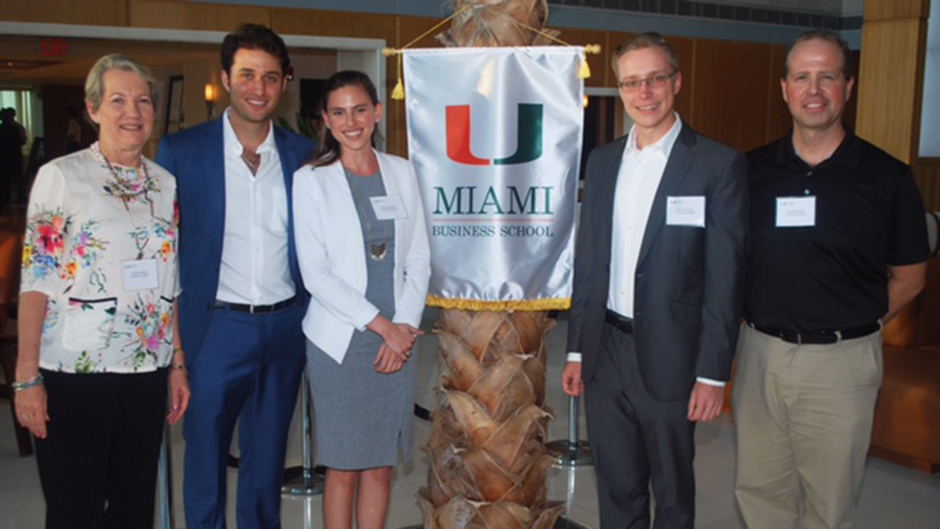A team of University of Miami students took first place in the Miami Business School’s second annual Impact Investing in Commercial Real Estate competition for case studies focused on improving communities. Brandon Sultanik, MBA ’18, Karl Thomson, MBA ’17, and Erin Sutherland, a graduate student in the School of Architecture, captured the $12,500 award for their innovative NoBe Town Center project for north Miami Beach.
A Cornell University team took the $7,500 second-place award, a Rutgers University team received the $5,000 third-place award, and a New York University team claimed fourth place.
“All four finalist teams gave excellent presentations, including innovative approaches to public-private financing,” said Andrea Heuson, professor of finance who organized the case-study competition for business schools with real estate programs. “Impact investing to improve communities, as well as deliver financial returns, is a vital issue in commercial real estate, and we look forward to another exciting competition next year.”
Sponsored by the Business School’s Real Estate Advisory Board, the competition concluded on April 6 with the judging and a reception at the Conrad Miami. The judges were three experienced real estate professionals: chief judge Katarzyna Pozniak, investment analyst for PGIM Real Estate in New York; Ryan Bandy, vice president of Clarion Partners in Dallas; and Marcelo Kingston, managing director of Multiplan, a Brazilian retail real estate company.
At the competition, the UM team presented “NoBe: A Sustainable and Resilient Plan for North Beach,” a $280 million five-block pedestrian-friendly town center with four residential towers, office and retail space, and a central plaza with a 50,000-square-foot community center. Of the 476 apartment units, 96 would be leased at below-market rates for lower-income North Beach residents.
To address the threat of rising sea levels, NoBe Town Center would be built on three-story plinths with flexible retail and parking space on the first- and second-floors that could be adapted to changing environmental conditions. NoBe would aim to achieve LEED Gold rating, incorporate a “green” roof, and a small solar panel roof area for heating and electricity, as well as energy-efficient interior system features.
“This competition took the knowledge we gained from our classes into the real world,” said Thomson. Sultanik said it was exciting to watch the NoBe plan unfold, while Sutherland appreciated the collaboration between real estate development and finance students on a multidisciplinary project.
The Cornell University MBA team—Miguel Klipstein, BBA ’11, Alejandor Garza and Mark Hughes—proposed a creative retail-entertainment development for the eastern end of a former concrete roadway on the Rickenbacker Causeway to Key Biscayne. Under their $19.8 million “Sunset Pier” plan, shipping containers would be refurbished and transported to the 50,000-square-foot vacant fishing pier where they would be turned into restaurants, bars and retail shops.
“Sunset Pier has the potential to become the next great attraction in Miami, similar to Navy Pier in Chicago or Steel Pier in Atlantic City,” said Klipstein. “It will transform an underutilized property in an environmentally friendly manner and invigorate the community.”
Graduate students at Rutgers, The State University of New Jersey, Brian Theodore, Christian Ramos, Louis Marchetta and Owen Christensen, proposed “New Jersey City University – West Campus Redevelopment,” transforming a vacant parking lot into a $62 million mixed-use project. Under their proposal, the 22-acre site on the neglected western side of Jersey City would have a three-story commercial building with office, retail and educational space, including a neighborhood pharmacy and job-training center, along with 750 new housing units.
The New York University team of Stephanie Noyes, Sid Prabhakar, Jeffrey Slavin and Ronald Ying proposed “Broad Street Commons,” repositioning a landmark office building in downtown Newark as a $145.9 million mixed-use center. The 21-story building would have 341 apartments, including 68 with affordable rents, a job training center, health and fitness facilities and other office and retail, while retaining a Verizon data center on the fifth floor.
Reflecting on the competition, Heuson said, “Our goal is to bring attention to worthy projects in a way that allows students to gain real-world feedback from local professionals who are experts in assessing the risks and rewards of opportunistic investment in commercial real estate.”

